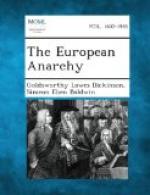application of the principle of equal commercial opportunity.
An agreement of 1909 between France and Germany, whereby
both Powers were to share equally in contracts for
public works, was found in practice not to work.
The Germans pressed for its application to the new
railways projected in Morocco. The French delayed,
temporized, and postponed decision.[3] Meantime they
were strengthening their position in Morocco.
The matter was brought to a head by the expedition
to Fez. Initiated on the plea of danger to the
European residents at the capital (a plea which was
disputed by the Germans and by many Frenchmen), it
clearly heralded a definite final occupation of the
country. The patience of the Germans was exhausted,
and the Kaiser made the coup of Agadir. There
followed the Mansion House speech of Mr. Lloyd George
and the Franco-German agreement of November 1911,
whereby Germany recognized a French protectorate in
Morocco in return for concessions of territory in
the French Congo. These are the bare facts of
the Moroccan episode. Much, of course, is still
unrevealed, particularly as to the motives and intentions
of the Powers concerned. Did Germany, for instance,
intend to seize a share of Morocco when she sent the
Panther to Agadir? And was that the reason
of the vigour of the British intervention? Possibly,
but by no means certainly; the evidence accessible
is conflicting. If Germany had that intention,
she was frustrated by the solidarity shown between
France and England, and the result was the final and
definite absorption of Morocco in the French Empire,
with the approval and active support of Great Britain,
Germany being compensated by the cession of part of
the French Congo. Once more a difficult question
had been settled by diplomacy, but only after it had
twice brought Europe to the verge of war, and in such
a way as to leave behind the bitterest feelings of
anger and mistrust in all the parties concerned.
The facts thus briefly summarized here may be studied
more at length, with the relevant documents, in Mr.
Morel’s book “Morocco in Diplomacy.”
The reader will form his own opinion on the part played
by the various Powers. But I do not believe that
any instructed and impartial student will accept what
appears to be the current English view, that the action
of Germany in this episode was a piece of sheer aggression
without excuse, and that the other Powers were acting
throughout justly, honestly, and straightforwardly.
The Morocco crisis, as we have already seen, produced
in Germany a painful impression, and strengthened
there the elements making for war. Thus Baron
Beyens writes:—
The Moroccan conflicts made many Germans
hitherto pacific regard another
war as a necessary evil.[4]
And again:—




